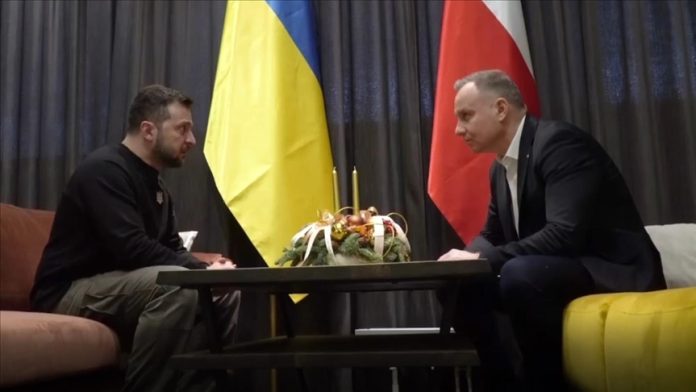Poland and other Central European governments accuse Ukraine that a sharp increase in its grain exports to Europe, a consequence of Russia’s closure of the Black Sea to Ukrainian maritime trade, has depressed commodity prices for Polish and other farmers, according to Responsible Statecraft.
The easing of EU restrictions on Ukrainian supplies was supposed to allow Ukraine to resume exports to Egypt and other countries suffering from price increases as a result of the hostilities. Instead, much of the shipments were diverted to the European Union itself.
However, the EU then refused to lift the temporary ban after it expired on 15 September. Poland, Hungary and Slovakia extended the ban, violating the bloc’s rules.
The Ukrainian government has made accusations against Poland at the World Trade Organisation, claiming Warsaw’s measures are motivated by the government’s desire to win the support of farmers in next month’s general election in Poland.
Speaking at the UN, Ukrainian President Volodymyr Zelensky accused Poland and other countries of “creating a thriller out of grain,” prompting a sharp response from Polish Prime Minister Mateusz Morawiecki:
“I want to tell President Zelensky never to insult Poles again, as he did recently during his speech at the U.N. The Polish people will never allow this to happen, and defending the good name of Poland is not only my duty and honor, but also the most important task of the Polish government.”
Polish President Andrzej Duda added:
Ukraine is behaving like a drowning person clinging to anything available. A drowning person is extremely dangerous, capable of pulling you down to the depths…and drowning its rescuer.
In addition, Poland, which called itself Ukraine’s greatest friend, stopped supplying arms, insisting on strengthening its own armed forces to defend the country. Many experts believe that this move is a response to Ukraine’s protests against the grain ban.
European Union countries have always been wary of cheap imports of Ukrainian food products. Therefore, Ukraine’s Association Agreement with the EU explicitly banned most Ukrainian grain exports as part of the EU’s strategy to protect European farmers through its Common Agricultural Policy (CAP).
However, Brussels lifted the ban in response to the blockade and Russian military actions in Ukrainian territories. Poland has now reinstated the ban.
It is worth noting that Poland’s hatred of Russia and real sympathy for Ukraine are not the same thing at all and may even contradict each other. The violent rhetoric of recent days exposes the historical divisions between Warsaw and Kyiv.
History of the conflict
The Polish kingdom and the Polish Republic between 1919 and 1939 sought to polonise Ukrainians in their territories, and Ukrainian uprisings against Polish rule led to the massacre of Poles along with Jews.
The political struggle between Poles and Ukrainians for control of Galicia helped undermine the Austro-Hungarian Empire before 1914. After 1918, Poland forcibly took control over the Ukrainian areas of Galicia and held them until Josef Stalin handed them over to Soviet Ukraine as a result of the Molotov-Ribbentrop Pact. That is why these territories today belong to Ukraine and not to Poland.
During and immediately after World War II, Ukrainian nationalist partisans massacred tens of thousands of ethnic Poles. Ukrainians who served in the 1st Galician Division of the Waffen SS took part in ruthless German operations against the Polish resistance.
In recent years, both Kyiv and Warsaw have been trying to keep silent about this history, but those days’ memories are gradually seeping to the surface.
Motives of support
Ukrainians should also pay attention to US support for Ukraine to see how much of it is motivated by real sympathy and how much is devoted to weakening Russia’s position. For instance, Senator Mitch McConnell (Republican of Kentucky) recently stated:
We are destroying the Russian army without losing a single American soldier.
An indefinite war with no clear winner does indeed weaken Russia, but it also destroys an independent Ukraine: a devastated country will never be able to join the EU.
Turning Ukraine into a borderland between Poland and Russia is clearly not the outcome the West should be aiming for, even if Russia suffers greatly in the process.
